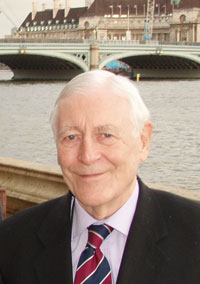
Eric Lubbock, 4th Baron Avebury
Eric Reginald Lubbock, 4th Baron Avebury (29 September 1928 – 14 February 2016), was an English politician and human rights campaigner. He served as the Liberal Member of Parliament for Orpington from 1962 to 1970. He then served in the House of Lords, having inherited the title of Baron Avebury in 1971, until his death. In 1999, when most hereditary peers were removed from the House of Lords, he was elected by his fellow Liberal Democrats to remain. When he died, he was the longest serving Liberal Democrat peer.
The Lord Avebury
Seat abolished [a]
Seat established [a]
29 September 1928
London, England
14 February 2016 (aged 87)
London, England
Liberal (before 1988)
Liberal Democrat (after 1988)
-
Kina-Maria O'Kelly de Gallagh(m. 1953; div. 1983)
-
Lindsay Stewart(m. 1985)
4, including Lyulph
Ahmadiyya Muslim Peace Prize (2009)
Early life and career[edit]
A descendant of William Lubbock (1701–1754), he was born in Chelsea, London, the son of Maurice Fox Pitt Lubbock (the sixth son of John Lubbock, 1st Baron Avebury) and Mary Katherine Adelaide Stanley, daughter of Arthur Stanley, 5th Baron Stanley of Alderley.[1]
Lubbock was educated at Upper Canada College, an all-boys private school in Toronto, Canada, and at Harrow School, an all-boys public school in London. He read Engineering Science at Balliol College, Oxford.[1]
He served as a Lieutenant in the Welsh Guards and joined Rolls-Royce in 1951. At the company, he was employed as a production manager (1951–1956) and as a production engineer (1956–1960).[1]
Parliamentary career[edit]
Having joined the Liberal Party in 1960 and become a councillor the following year, Lubbock stood as his party's candidate at the Orpington by-election on 15 March 1962, and gained the seat with a majority of 7,855,[2] a swing of nearly 22% from the Conservatives. At the time, the victory was seen as a revival of the Liberal Party, and brought the number of Liberal MPs to seven.[2][3] Lubbock was dubbed "Orpington Man".[4] However, the party did not make the anticipated recovery. It was hampered by organisational difficulties, and progress was slow, with a loss of votes and seats during the period of Harold Wilson's Labour government.
Lubbock held Orpington in 1964 and 1966, both times against Guinness World Records founder Norris McWhirter. "When I beat McWhirter for the second time in 1966", Lubbock said in 2015,[5] "he said at the count that he now realised that the people in Orpington were only interested in their back gardens. And I was very pleased by that because it confirmed my attempts to look after people's local concerns."
As the MP for Orpington, Lubbock was appointed Chief Whip by Jo Grimond in 1963, a post he held until 1970. When Grimond resigned as party leader in 1967, Lubbock was one of the three Liberal MPs who stood for the position. Jeremy Thorpe won the contest with six votes, with Emlyn Hooson and Lubbock getting three apiece.[1]
As the only Liberal on the Speaker's Conference on Electoral Reform from 1963 to 1965, he attempted to reduce the voting age to 18 and to introduce the Single Transferable Vote system of Proportional Representation for general elections.[6]
Lubbock initiated the Caravan Sites Act 1968 as a Private member's bill, which mandated that councils assess and provide for the needs of Gypsy, Roma and Traveller people passing through their boroughs, in order to provide unused land for them to camp on. 324 sites were created in all, but many councils "delayed, minimized or completely avoided provision of the sites for Gypsies in England." The perceived ineffectiveness of the Act led to its repeal by the Conservative government in 1994.[7]
In the Commons, Lubbock was on the Speaker's Commission on Electoral Law (1964–1966), and proposed STV in multi-member constituencies, only to be voted down by 18–1. He also proposed reducing the voting age to 18, and two Labour Members supported him. Orpington reverted to being a Conservative seat at the 1970 general election. On losing the seat Lubbock said, "In 1962 the wise, far-seeing people of Orpington elected me as their Member; in 1970 the fools threw me out" (it is sometimes reported he said "the bloody fools").[1]
The following year, John Lubbock, 3rd Baron Avebury, died without a male heir and Eric Lubbock, his cousin, succeeded him. As Baron Avebury, he sat on the Royal Commission on Standards of Conduct in Public Life (1974–1976), and was Liberal Spokesman on Immigration and Race Relations (1971–1983). Throughout his time in politics he was involved in human rights activism, both in and beyond Parliament. In 1976, he founded the Parliamentary Human Rights Group, which he chaired for the next 21 years. He continued as Vice-Chair after standing down.[1]
In 1974, Avebury was asked by Liberal leader Jeremy Thorpe to lead the Liberal general election campaign that year.[8]
In 1987, as a jocular protest against the cost of cremation, he offered to leave his body to Battersea dogs home "to vary the inmates' diet." Bill Wadman-Taylor, manager of the home, said: "I am sure there is a lot of nutritional value in the noble Lord and the dogs are not fussy, but we just couldn't do it."[6] On being advised that the dogs would probably accept but the home's management wouldn't, he made the same offer to the cats.[9]
He was a member of the Liberal Democrat Foreign Affairs Team, speaking on conflict resolution and human rights.[1]